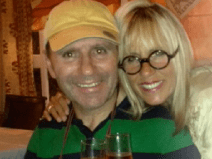The Challenge
Fifty-eight-year-old Chef Toni Pais is no stranger to the spotlight. His worldwide recognition for artistic and award-winning meals is something he has grown used to. A wall of plaques at his home in Pittsburgh is literally running out of space.
His famed restaurant Baum Vivant was named Restaurant of the Year by Pittsburgh Magazine for a record eight years in a row, and in 2000, the magazine named Toni Best Chef. He’s recognized in Pittsburgh just as much as the local sports stars, and in his native Portugal, he’s a legend.
But when Toni began to notice that his left arm was shaking uncontrollably at times, the spotlight suddenly turned on his health.
"I’m working full time, working out almost every day, playing soccer twice a week and just back to my old self." — Toni
Being very aware of his body and well-being, Toni immediately sought help from his primary care physician (PCP). He was diagnosed with early stages of Parkinson’s disease, a disorder of the brain that leads to shaking and difficulty with walking, movement, and coordination. He was prescribed medications to prevent the symptoms and quickly returned to his hard-working lifestyle.
Despite the medications, the disease and symptoms progressed. He started having difficulty cooking at his restaurant, and when he held cooking lectures and classes, the shaking made it difficult to concentrate.
“I would notice people staring at my shaking arm, and it was really hard to stay on point and give a meaningful lecture,” he said. “I knew at that point that something else needed to be done. I didn’t want to live the rest of my life like that.”
Schedule an Appointment or Ask a Question
The Solution
After a visit with his neurologist to discuss his ongoing and progressive symptoms, Toni was referred to a UPMC neurosurgeon. After reviewing Toni’s medical history and symptoms, the neurosurgeon determined that Toni was an excellent candidate for deep brain stimulation.
Deep brain stimulation is a surgical procedure in which a thin wire (electrode) is implanted in the area of the brain that is responsible for abnormal movement. The wire is connected to a pulse generator that is implanted under the skin below the collarbone. Once activated, the generator sends mild electrical pulses through the wire to the brain. These electrical pulses modify the brain’s electrical signals to help control or stop abnormal movements.
The traditional or “awake” DBS procedure involves communicating with the patient to determine the best placement of the electrode. But a new method of performing DBS inside an MRI scanner allows surgeons to see real-time images of the brain to guide the procedure while the patient is under general anesthesia.
For Toni, he felt more comfortable being under anesthesia rather than being awake for the procedure.
The Results
With Toni fully sedated, the procedure was performed within the MRI scanner. A month later, after Toni’s brain recovered from the initial surgery, a team of neurologists activated the pulse generator. Almost immediately, Toni felt the results, and his wife Becky saw an instant change.
“As soon as Toni stood up, I saw the Parkinson’s literally drain from his body,” she said. “He didn’t have that frozen looking face anymore, and that’s when I knew he was back. It was such an amazing moment.”
A valuable function of the DBS procedure is the ability to adjust the strength of the pulses going to the brain. If Toni feels like his shaking is about to come back, or has started slightly, he can adjust the strength of electrical pulses. If he’s feeling like he’s having a good day with his symptoms, he can turn the strength of the pulses down.
Months after the operation, Toni’s symptoms continued to lessen and he is back to doing what he does best – laughing, joking, and cooking at his current restaurant, Café Zinho.
And to the surprise of his wife, certain aspects of Toni’s life have somehow improved."I’m working full time, working out almost every day, playing soccer twice a week and just back to my old self. I’m so happy with how everything turned out" — Toni
“His focus has never been better, and I don’t think his cooking has ever been so good. I can’t explain it, but I love it,” she said.
Our patient stories profile a number of patients who have had minimally invasive brain surgery at UPMC. Although everyone's care experience is unique, we hope that sharing these stories will help other prospective patients and their families better understand these procedures and their potential benefits.
Toni's treatment and results may not be representative of all similar cases.

















